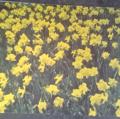Complicated writing style, but an interesting read
3 steloj
I found Daughter Of The Killing Fields by Theary Seng on the book exchange shelves at Camping Casteillets in France. Knowing little about the Khmer Rouge in Cambodia other than what I had learned from The Killing Fields film which I watched years ago, I thought it would be interesting to read an account by someone who actually lived through the regime's rule. Dave attempted to read this book before me and gave up fairly early on because he couldn't get on with the writing style and I also found it difficult to identify all the different people about whom Seng writes. There is a family tree diagram and glossary of Cambodian honorifics at the front of the book, but names seem change depending on the speaker which is tricky for my Western mind to grasp.
Seng was only four years old when the Khmer Rouge came to power so …
I found Daughter Of The Killing Fields by Theary Seng on the book exchange shelves at Camping Casteillets in France. Knowing little about the Khmer Rouge in Cambodia other than what I had learned from The Killing Fields film which I watched years ago, I thought it would be interesting to read an account by someone who actually lived through the regime's rule. Dave attempted to read this book before me and gave up fairly early on because he couldn't get on with the writing style and I also found it difficult to identify all the different people about whom Seng writes. There is a family tree diagram and glossary of Cambodian honorifics at the front of the book, but names seem change depending on the speaker which is tricky for my Western mind to grasp.
Seng was only four years old when the Khmer Rouge came to power so this book includes her own memories as well as information gleaned from interviews with surviving family members and other Cambodians. Their stories are horrific especially considering that these events were just forty years ago. I wasn't reading about ancient barbarity, but recent history and this is particularly shocking to consider. Seng writes about how her father was deceived into walking to his death, her time in prison before her mother vanished, and her years of rural peasantry. What shines through her memoir is the ingenuity and strength of these people, their struggle to survive but also their quiet acceptance of the inevitability of death. Perhaps a professional writer might have created a more accessible book overall, however there was a certain raw power in knowing that the person whose words I read had really experienced these incredible years.

